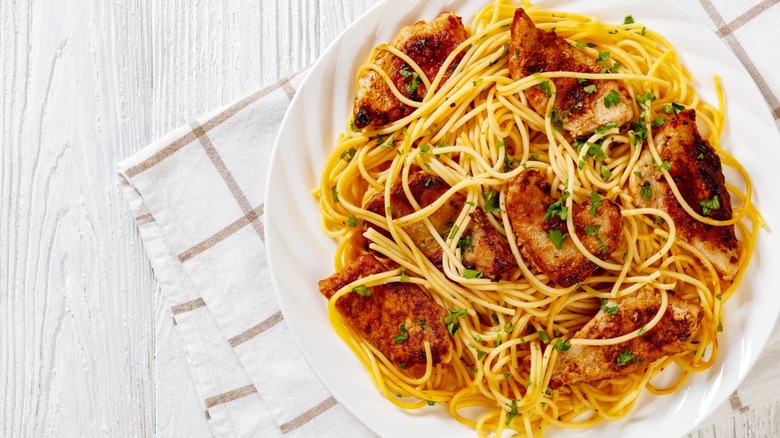The Olive Garden Pasta Dish That Isn't Even From Italy
From its breadsticks to the never-ending pasta bowl, Olive Garden has been the subject of various TikTok challenges or mukbangs. Although the popular chain restaurant gets a lot of flack for not being traditionally Italian, which, depending on the person, could be a deal breaker or just an insignificant detail. Nevertheless, it is true that most of Olive Garden's recipes do not follow the most traditional Italian ones.
One of these dishes that strays very far from Italy is the chicken scampi. The meal features angel hair pasta, chicken, bell peppers, and red onions, all mixed with what Olive Garden describes as scampi sauce. This sauce usually consists of a white wine sauce with lemon, olive oil, and garlic, along with some heavy cream, red pepper flakes, and black pepper. Chicken scampi is a variation of shrimp scampi, a well-known Italian-American dish, also served at Olive Garden. However in Italy, "scampi" isn't the usual pasta dish you might expect. Scampi is the plural version of scampo, which is a small crustacean that is reminiscent of a lobster or a prawn.
What does the traditional Italian scampi entail?
In Italy, it is typical for a "scampi" to include just a few of the langoustine pieces with the sautéed white wine garlic and oil. There is no such similar sauce with heavy cream or red pepper flakes, and pasta is usually not served with this meal at all. Somewhere along the way Italian-American chefs began to replace the scampo with shrimp instead, and the recipe evolved from there. Technically, the shrimp or chicken scampi recipe name translates to shrimp prawn/lobster or chicken prawn/lobster. The name's inaccuracy is one of the main critiques of the dish.
Olive Garden's chicken scampi is a sort of domino effect of its origins. Not only does the chicken scampi recipe substitute chicken for shrimp, but the original recipe doesn't even have shrimp in it! Similar to other Italian-American recipes, including the chain restaurant's iconic Alfredo or zuppa toscana soup, these items often get named as the least traditional, although that certainly doesn't make them any less popular or beloved.

